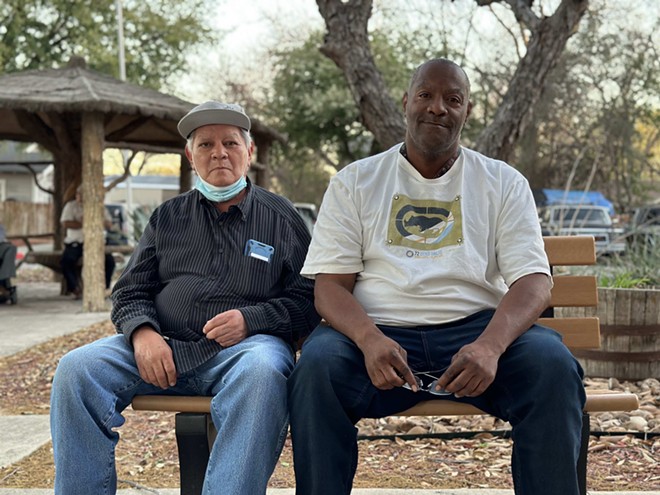Last year, the Alamo City recorded 54% more homicides and 55% more car thefts than in 2021, according to San Antonio Police Department statistics.
However, as those rates rise, an already vulnerable part of the city's population says it's grappling with a worrying lack of security.
People living in subsidized low-income housing owned and operated by Opportunity Home — formerly known as the San Antonio Housing Authority — told the Current that the housing agency has abolished security guards at its complexes. What's more, tenants maintain that their complaints about rising crime at Opportunity Home facilities have largely gone ignored.
Frank "Pancho" Valdez, a San Antonio Tenants Union organizer who's lived in The Lofts at Marie McGuire for eight years, said instances of robbery, vandalism and drug dealing at the downtown development have skyrocketed in recent months. However, when tenants complain to the property managers, their concerns often fall upon deaf ears, he added.
"We're treated like inmates, and when we have legitimate grievances, they're ignored," Valdez said. "Most people in [Opportunity Home] housing worked most of their lives. It's not like we're welfare bums."
In an email to the Current, Opportunity Home spokesperson Bianca Garcia said the agency stopped hiring security personnel at properties in which the majority of residents are elderly after funds from the pandemic-era CARES Act were exhausted.
"With limited non-federal funds, we have a contracted security company that provides regular patrols throughout our nearly 100 properties," Garcia said.
Management woes
Tenants at the Lewis Chatham Apartments on San Antonio's South Side said their concerns about lack of security are compounded by what they said amounts to Opportunity Home's inability to conduct internal investigations.
Tenant James Hamilton said that in December 2020, he was approached by another resident who pulled a gun on him while he waited at a bus stop located at the apartment complex.
Hamilton managed to alert a security guard, who was stationed at the complex thanks to funding from the CARES Act. The man who threatened Hamilton then fled the scene, according to a police report obtained by the Current.
Hamilton told the Current he's unsure whether he'd still be alive if the guard hadn't been there.
The suspect was ultimately arrested and charged with making a terroristic threat, according to SAPD records. Even though the man ultimately pled guilty to the charges in Bexar County court, Hamilton said Opportunity Home's internal investigation turned up nothing.
"Even after the guy was convicted, the CEO of [Opportunity Home], Mr. Ed Hinojosa, said there wasn't evidence that it even happened," Hamilton said.
The investigation into Hamilton's run-in with the armed man isn't the first time Opportunity Home has dropped the ball during an inquiry into an incident at the Chatham Apartments, tenants allege.
Emilio Quinones suffered a stroke eight years ago, which hindered his ability to walk, write and speak clearly, his sister Yolanda Alcorta told the Current.
On March 15, 2022, a tenant whom Chatham residents allege files frequent false police reports accused Quinones of public intoxication and making lewd remarks, according to Opportunity Home paperwork.
"He's not an alcoholic," Alcorta said. "He had a stroke. He doesn't walk right, and he doesn't talk right. But [management] always assumes he's drunk."
After the tenant filed the police report, Opportunity Home began the process of evicting Quinones from his apartment, she said.
However, Alcorta — along with residents who witnessed the incident — sought help from Texas RioGrande Legal Aid (TRLA), a nonprofit that offers free legal services. After TRLA intervened, the housing agency dropped the eviction, citing the lack of evidence against Quinones, documents show.
If there had been security on the property, Alcorta said the incident likely would never have made it to court. She said guards would have been familiar with Quinones' condition and would have stopped management from pursuing an eviction.
Opportunity Home officials said in an email that disputes between neighbors can't be resolved by security guards.
Focused on Development
Even though Opportunity Home sends third-party security patrols through its complexes, Valdez, Hamilton and Alcorta said their appearances are few and far between.
Resident Maureen Galindo, who lives at the Refugio Place Apartment Homes near Southtown, argues that Opportunity home would have the funds to hire more security if it wasn't so focused on developing mixed-income housing.
Prior to the early 2000s, Opportunity Home – then SAHA – owned and operated apartment complexes comprising only low-income subsidized housing. One such example is Victoria Courts, which opened in 1940.
However, the Lavaca-neighborhood complex was demolished in 2000 to make way for a new mixed-income development called Victoria Commons.
The 213-unit master-planned Victoria Commons would be owned and operated by Opportunity Home, but only 20% would be subsidized and set aside for low-income housing. The remaining 169 units would be leased at market rates, according to now-defunct news site the San Antonio Heron.
"[Opportunity Home] isn't really taking care of its tenants or residents anymore," said Galindo, a Tenant Union organizer whose master's thesis was on gentrification. "If you go to the board meetings, so much of their time and energy goes towards these new developments."
Opportunity Home is diverting funding needed for security and maintenance toward these new developments, Galindo alleges. The new mixed-income developments also increase neighborhoods' desirability, meaning that rents — even for those living in subsidized housing — go up, she added.
However, in public comments, Opportunity Home officials maintain that mixed-income developments improve the standard of services offered to low-income tenants and reduce crime by preventing high concentrations of poverty.
Garcia said the agency doesn't funnel funds away from security to fund new developments.
"An ongoing misperception that the organization has the allocated funding in its possession is often formed by those with little, to no, knowledge in housing finance," she said. "Funds are not readily available and instead are housing credits for new development projects."
Valdez of the Tenant's Union said he just wants someone to listen to tenants' concerns. To that end, his group has spoken to District 1 City Councilman Mario Bravo and plans to meet with U.S. Rep Joaquin Castro, D-San Antonio, in coming weeks.
Even so, with developers snatching up SA housing properties and citywide rents rising more than 20% last year, according to a report by online real estate marketplace Redfin, Valdez acknowledges that time is running short to get results.
Follow us: Google News | NewsBreak | Instagram | Facebook | Twitter

















